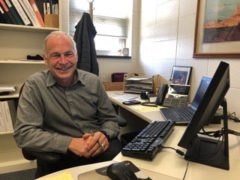UWRF to feature 'Year of Canada'
Falcon News Service
April 25, 2018
As the 2017-2018 academic year on the University of Wisconsin-River Falls campus comes to an end, so does the Year of South Korea. For those still not quite ready to say goodbye to the Year of South Korea, there is still one last event to enjoy. From May 21 to June 8 there will be a photo exhibition of Jeju Island at the River Falls Public Library.
This upcoming school year the UWRF campus will shift its focus from the country of South Korea to our neighbor to the north. For the 2018-2019 school year, the UWRF The ‘Year of’ Strategic Implementation Committee has decided to feature the country of Canada. The selection committee is made up of the Provost, the director of the library, director of student life, director of global connections, a food service representative, chair of student senate and two or more faculty or staff from the University.

Donavon Taylor, the department chair and professor of soil science, is also currently the chair of the Implementation Committee. He and his fellow committee members use a specific set of criteria to narrow down which country will be chosen to feature for the ‘Year of’ program on campus. Some of this criteria includes: What resources and what experts do we know or have access to that are from that country, the country’s impact politically and economically in the world and what impact the cultural and further learning about the country can have on students and the community. The International Program Committee,which helps to select the ‘Year of’ country, also uses results from surveys sent to faculty and academic staff of the university to select the year’s country. Countries are selected two years in advance.
Unlike South Korea, Canada seems to be so familiar to Americans, and especially to border states like Minnesota and Wisconsin. But how well do we actually know Canada? That was one of the main reasons that the country was selected, according to Taylor.
“We think they're just like us, but they're not. We could raise awareness of their importance to the United States as a trading partner and long-standing ally in many ways. But also the culture can be really quite different," said Taylor. “There are a lot of significant differences that we, students, faculty and staff may not be aware of that makes this a great educational opportunity.”
Some of those differences were brought up by Fulbright faculty representative on the 'Year of' committee and English professor Marshall Toman during his initial proposal for the ‘Year of’ program to focus on Canada. Toman cites the French language, which is a large part of Canadian culture, their different currency (their Canadian Dollar is even made out of plastic) and different customs as reasons why UWRF needed to select Canada.
Canada is still vastly unknown to Americans and as Canada is one of our biggest trading partners. Toman said we owe it to know more about the country, particularly since UWRF has featured past big United States trading partners in the 'Year of' program before.
“How rude is it for people like us to not know enough about our neighbor? I grew up in Minnesota, but even if you grew up in Kansas, [Canada] is your country's neighbor," said Toman. "So part of the Year of Canada is to be a better neighbor. One thing you do is to invite them in and introduce yourself; lets do that with Canada."
The types of programming and events that will take place during the upcoming ‘Year of Canada’ will depend on the faculty, staff, and students on campus. The Implementation Committee does not set up or create events, but instead helps to fund and promote those proposed activities.
Toman, as the Fulbright scholar representative at UWRF, has the goal of utilizing his Fulbright resources to get two Fulbright scholars a semester to speak on four different fields of study on campus. These Fulbright scholars would be able to expose faculty, staff, students and the community with an array of Canadian experts in forestry, fisheries, art, drama, agriculture or business.
No events have been proposed yet, but Taylor said that he expects at least the music department to add aspects of Canada into the music curriculum. Food services may also feature Canadian food in the dining hall and to be made available for catering on campus.
Sue Boettcher, Director of Dining Services, said that no menus featuring Canadian food have been developed as of yet.
Chair of the Implementation Committee Donavon Taylor is looking forward to the ‘Year of Canada’ program, which he hopes will engage UWRF faculty, staff, students and the River Falls community.
“We hope that this allows for more students to actually visit this country,” Taylor said. “Or that maybe the ‘Year of Canada’ makes them want to visit.”
The University of Wisconsin-River Falls prioritizes international education and sends the second-largest percentage of students to study abroad in the entire UW system. At UWRF, a core value of the university is global engagement. Toman said he would like UWRF students and international program directors to start seeing Canada as a foreign country, just like going off to Spain or China. This may allow them to start sending students to Canada to study.
Toman pointed out that, "You get a whole new perspective on the world when you start seeing just a little bit from the perspective of people from another country."
